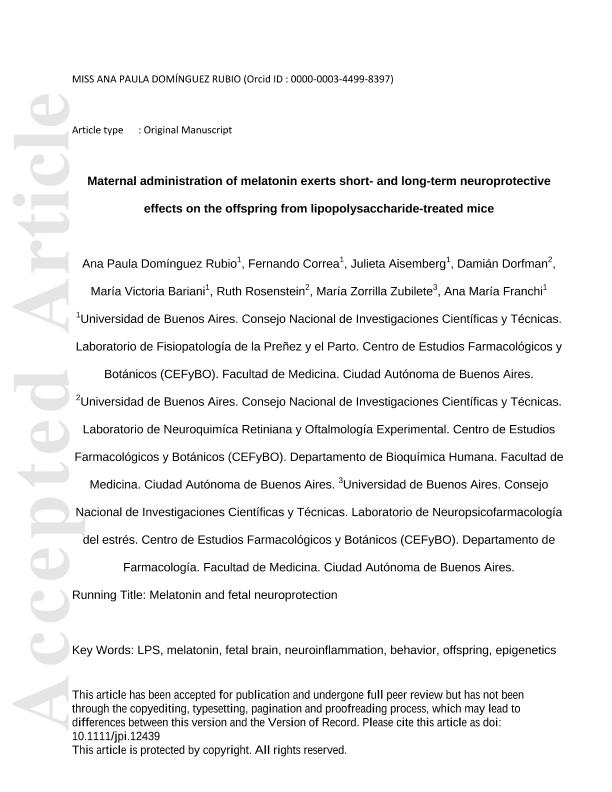Artículo
Maternal administration of melatonin exerts short- and long-term neuroprotective effects on the offspring from lipopolysaccharide-treated mice
Domínguez Rubio, Ana Paula ; Correa, Fernando Gabriel
; Correa, Fernando Gabriel ; Aisemberg, Julieta
; Aisemberg, Julieta ; Dorfman, Damián
; Dorfman, Damián ; Bariani, Maria Victoria
; Bariani, Maria Victoria ; Rosenstein, Ruth Estela
; Rosenstein, Ruth Estela ; Zorrilla Zubilete, María Aurelia
; Zorrilla Zubilete, María Aurelia ; Franchi, Ana Maria
; Franchi, Ana Maria
 ; Correa, Fernando Gabriel
; Correa, Fernando Gabriel ; Aisemberg, Julieta
; Aisemberg, Julieta ; Dorfman, Damián
; Dorfman, Damián ; Bariani, Maria Victoria
; Bariani, Maria Victoria ; Rosenstein, Ruth Estela
; Rosenstein, Ruth Estela ; Zorrilla Zubilete, María Aurelia
; Zorrilla Zubilete, María Aurelia ; Franchi, Ana Maria
; Franchi, Ana Maria
Fecha de publicación:
11/2017
Editorial:
Wiley Blackwell Publishing, Inc
Revista:
Journal of Pineal Research
ISSN:
0742-3098
Idioma:
Inglés
Tipo de recurso:
Artículo publicado
Clasificación temática:
Resumen
Preterm birth is a major contributor to early and delayed physical and cognitive impairment. Epidemiological and experimental data indicate that maternal infections are a significant and preventable cause of preterm birth. Recently, melatonin has been suggested to exert neuroprotective effects in several models of brain injury. Here, we sought to investigate whether the administration of melatonin is able to prevent lipopolysaccharide (LPS)-induced fetal brain damage in a model of LPS-induced preterm labor. For this purpose, 15-day pregnant BALB/c mice received intraperitoneally 2 doses of LPS or vehicle: the first one at 10:00 hours (0.26 mg/kg) and the second at 13:00 hours (0.52 mg/kg). On day 14 of pregnancy, a group of mice was subcutaneously implanted with a pellet of 25 mg melatonin. This experimental protocol resulted in 100% of preterm birth and pup death in the LPS group and a 50% of term birth and pup survival in the melatonin + LPS group. In the absence of melatonin, fetuses from LPS-treated mothers showed histological signs of brain damage, microglial/macrophage activation, and higher levels of IL-1β, inducible nitric oxide synthase (NOS), and neuronal NOS mRNAs as well as increased histone acetyltransferase activity and histone H3 hyperacetylation. In contrast, antenatal administration of melatonin prevented LPS-induced fetal brain damage. Moreover, when behavioral traits were analyzed in the offspring from control, melatonin, and melatonin + LPS, no significant differences were found, suggesting that melatonin prevented LPS-induced long-term neurodevelopmental impairments. Collectively, our results suggest that melatonin could be a new therapeutic tool to prevent fetal brain damage and its long-term consequences induced by maternal inflammation.
Archivos asociados
Licencia
Identificadores
Colecciones
Articulos(CEFYBO)
Articulos de CENTRO DE ESTUDIOS FARMACOLOGICOS Y BOTANICOS
Articulos de CENTRO DE ESTUDIOS FARMACOLOGICOS Y BOTANICOS
Articulos(IQUIBICEN)
Articulos de INSTITUTO DE QUIMICA BIOLOGICA DE LA FACULTAD DE CS. EXACTAS Y NATURALES
Articulos de INSTITUTO DE QUIMICA BIOLOGICA DE LA FACULTAD DE CS. EXACTAS Y NATURALES
Articulos(OCA PQUE. CENTENARIO)
Articulos de OFICINA DE COORDINACION ADMINISTRATIVA PQUE. CENTENARIO
Articulos de OFICINA DE COORDINACION ADMINISTRATIVA PQUE. CENTENARIO
Citación
Domínguez Rubio, Ana Paula; Correa, Fernando Gabriel; Aisemberg, Julieta; Dorfman, Damián; Bariani, Maria Victoria; et al.; Maternal administration of melatonin exerts short- and long-term neuroprotective effects on the offspring from lipopolysaccharide-treated mice; Wiley Blackwell Publishing, Inc; Journal of Pineal Research; 63; 4; 11-2017
Compartir
Altmétricas



